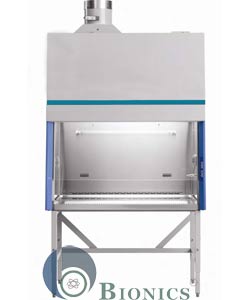The Blog on Biosafety Cabinets
The Blog on Biosafety Cabinets
Blog Article
Enhancing Laboratory Safety with Class 2 Biosafety Cabinets and Microbiological Protection

Maintaining a safe lab environment is crucial in today’s advanced research and clinical setups. Whether it's biotech development, pharmaceutical research, or microbiological analysis, biosafety cabinets form the backbone of contamination control.
Class 2 Biosafety Cabinets are widely adopted for offering three-way protection. These units are crucial for working with moderate-risk organisms and sensitive samples.
Biosafety Cabinets – How They Work and Why They Matter
Biosafety cabinets are specially designed, enclosed systems that ventilate and filter lab air. They use advanced filters to trap harmful particles before air re-enters the lab.
These units are generally classified into three main types: Class I, II, and III based on containment level. Among these, Class 2 cabinets are the most versatile and commonly used.
Defining Class 2 Biosafety Cabinets and Their Role
Class 2 Biosafety Cabinets ensure safety on all fronts—personnel, workspace, and biological material. They generate a vertical airflow that reduces turbulence and contamination.
Air is treated using dual filtration systems to ensure safe circulation and exhaust. These cabinets are frequently used in labs handling infectious agents or clinical samples.
What Makes Class 2 Cabinets Effective in Labs
A Class 2 microbiological safety cabinet includes several integrated safety mechanisms such as:
• High-efficiency air filters to ensure clean workspace air
• Laminar airflow that minimises disruption and contamination
• Negative pressure barriers to prevent leakage
• Optional UV lights for overnight sterilisation
• Noise-reducing construction for better working conditions
• Transparent sash or viewing window for easy access and monitoring
These elements support lab workers in maintaining sterile working environments.
Where Class 2 Cabinets Are Used
Class 2 Biosafety Cabinets are commonly used across microbiology, biotechnology, diagnostics, and pharma. They are ideal for safe handling of samples Biosafety Cabinets during testing and experimentation.
Whether in hospitals or drug manufacturing, these units are essential for clean procedures.
Advantages of Installing Class 2 Cabinets in Your Lab
Using Class 2 cabinets offers multiple advantages including operator protection and experimental reliability:
• Reduces the risk of sample cross-contamination and error
• Prevents accidental exposure to infectious materials
• Ensures filtered air is safe for release or recirculation
These cabinets support biosafety goals while improving lab productivity.
Design and Compliance Standards
Top manufacturers design units compliant with major biosafety regulations worldwide. Class 2 units are sub-classified as A1, A2, B1, and B2—based on varying airflow balance and ducting needs.
• Type A2: Ideal for general-purpose labs
• Type B2: Used for hazardous vapors and chemicals
Choosing the correct subtype is vital for achieving optimal safety and functionality.
Tips for Purchasing the Ideal Biosafety Cabinet
Before purchasing, consider:
• The biosafety level required (BSL-1, BSL-2, or BSL-3)
• Ventilation compatibility and placement
• Ease of use, energy efficiency, and upkeep
• Manufacturer reputation and post-sale support
Partnering with a trusted provider helps meet both performance and safety needs.
Best Practices for Using Class II Biosafety Cabinets
For optimal results:
• Install the cabinet in a draft-free, low-traffic zone
• Get periodic validation from certified technicians
• Ensure operators follow best practices
Operational best practices include:
• Maintain biosafety gear protocols
• Avoid sudden or quick arm movements
• Decontaminate surfaces before and after use
• Use UV lights only when cabinet is off and unoccupied
Why Class 2 Cabinets Are a Must-Have in Labs
Class 2 biosafety cabinets are essential for labs that value safety, precision, and cleanliness. They protect workers, secure samples, and copyright environmental standards.
From biotech and diagnostics to academia and pharma, Class II cabinets support world-class laboratory practices. When investing in a biosafety cabinet, prioritise compliance, usability, and long-term support—because your research deserves the best protection. Report this page